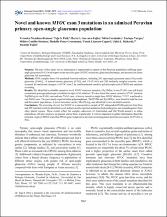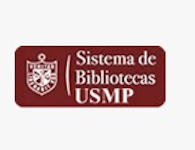Novel and known MYOC exon 3 mutations in an admixed Peruvian primary open-angle glaucoma population

View/Open
Trabajo
(application/pdf: 1.055Mb)
(application/pdf: 1.055Mb)
Date
2012Author(s)
Mendoza Reinoso, Veronica
Patil, Teja S.
Guevara Fujita, María Luisa
Fernández, Silvia
Vargas, Enrique
Castillo Herrera, Wilder
Perez Grossmann, Rodolfo
Lizaraso Caparó, Frank
Richards, Julia E.
Fujita, Ricardo
Metadata
Show full item recordAbstract
Purpose: The aim of this study was to characterize a representative sample of the Peruvian population suffering openangle
glaucoma (OAG) with respect to the myocilin gene (MYOC) mutations, glaucoma phenotype, and ancestry for future
glaucoma risk assessment.
Methods: DNA samples from 414 unrelated Peruvian subjects, including 205 open-angle glaucoma cases (10 juvenile
glaucoma [JOAG], 19 normal-tension glaucoma [NTG], and 176 POAG) and 209 randomly sampled controls, were
screened for nucleotide changes in MYOC exon 3 by conformational sensitive gel electrophoresis (CSGE) and mutation
screening.
Results: We identified a probable causative novel MYOC missense mutation, Gly326Ser, in one POAG case and found
a consistent genotype-phenotype correlation in eight of his relatives. We also found the known causative MYOC mutation
Trp286Arg in one JOAG case and one POAG case. A known causative single base MYOC deletion, T1357, was found in
one POAG case. Two previously reported silent polymorphisms, Thr325Thr and Tyr347Tyr, were found in both the case
and the control populations. A novel missense variant, Met476Arg, was identified in two unrelated controls.
Conclusions: The screening of exon 3 of MYOC in a representative sample of 205 independent POAG patients from Peru
and 209 matched controls identified novel and previously reported mutations (both pathogenic and nonpathogenic) from
other global regions. These results reflect the complex admixture of Amerindian and Old World ancestry in urban
populations of Latin America, in general, and in Peru, in particular. It will be important to gather information about the
ancestral origin of MYOC and other POAG gene mutations to develop screening panels and risk assessment for POAG in
Peru.
Collections
- Artículos [274]
Publisher
Molecular Vision
Rights
info:eu-repo/semantics/openAccess
Funding
National Eye Institute, National Institutes
of Health, Bethesda, MD (J.E.R.), Research to Prevent
Blindness (EY011671- J.E.R.), Universidad de San Martín de
Porres Funds E10012009016, E10012009011,
E10012009027, E10012012011, Consejo Nacional de
Ciencia y Tecnología (Concytec) proyecto OAJ-2003.







